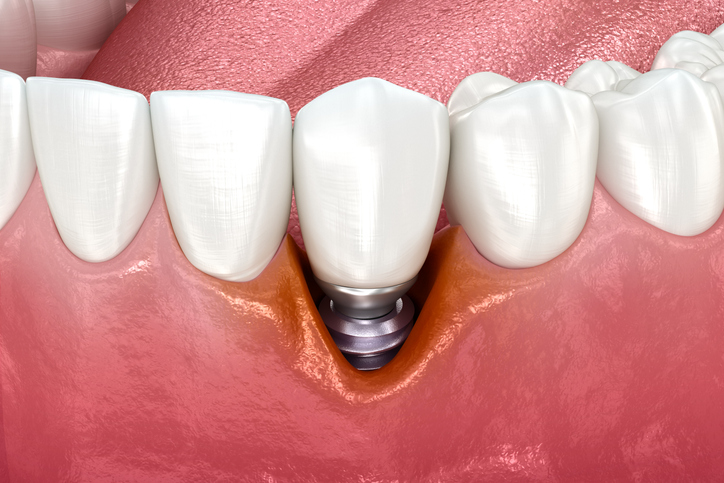
While peri-implantitis is not uncommon, it’s not something that affects every individual with dental implants. However, its prevalence makes it a significant concern in the world of dental health, emphasizing the necessity for its early detection and treatment to maintain the longevity of your dental implants.
Early detection and intervention can be a game-changer when it comes to effectively managing peri-implantitis. Through early identification of symptoms, the progression of the disease can be halted, preserving the integrity of your dental implants. Dr. Sams at Implant & Perio Center of Kansas believes that a proactive approach can significantly benefit our patients.
Today, we aim to equip you with the necessary knowledge on peri-implantitis. We’ll delve into understanding the symptoms to watch out for, the causes and risk factors, the variety of treatment options available, and how to prevent it through proper maintenance and care. This approach ensures you are not just a patient but an active participant in maintaining your dental health.
Identifying the Symptoms of Peri-Implantitis
Recognizing the signs of peri-implantitis early on is crucial. Common symptoms include gum redness, swelling, and bleeding around the implant site. You might also experience a loosening of the implant and bad breath or a bad taste in your mouth, which can indicate an infection. By keeping an eye out for these signs, you can reach out to our team for guidance and necessary intervention.
Peri-implantitis can progress through different stages, each presenting its own set of challenges. Initially, you might notice minor signs such as slight discomfort or mild swelling. However, as the condition worsens, the symptoms can escalate to more severe issues, including noticeable bone loss. Understanding these stages will help you maintain vigilance in your dental health journey.
It is recommended to consult with Dr. Sams at the earliest sign of any symptom indicative of peri-implantitis. Early consultation facilitates a more straightforward treatment pathway, potentially avoiding more complex procedures in the future.
In addition to regular check-ups, you can undertake self-assessment of your dental health at home. Our team suggests routine inspection of your implant sites for any signs of swelling, redness, or bleeding. Engaging in regular self-assessment aids in early detection, empowering you to take charge of your dental health effectively.
Understanding the Causes and Risk Factors
Understanding what causes peri-implantitis is integral in preventing its onset. The leading cause is bacteria that forms from dental plaque, which accumulates around the implant, eventually leading to infection and inflammation. Besides, improper installation of the dental implant can be a contributing factor, which emphasizes the importance of seeking care from skilled professional like Dr. Sams.
Certain health conditions such as diabetes, osteoporosis, and immune system deficiencies can increase your risk of developing peri-implantitis. It’s vital to maintain open communication with your dental team about your health history to tailor a dental care plan that suits you perfectly.
Lifestyle choices significantly influence your oral health. Smoking, in particular, can exacerbate the risk of developing peri-implantitis. Moreover, maintaining good oral hygiene and a balanced diet can go a long way in preventing this condition. We are here to help you understand how your lifestyle choices affect your dental health and assist you in making informed decisions.
Your dental history plays a substantial role in determining the likelihood of experiencing peri-implantitis. Patients with a history of periodontal disease are at a higher risk. Regular check-ups allow us to monitor any changes and take preventative measures timely.
Peri-Implantitis Treatment Options
There are non-surgical treatments available that can be effective in the early stages of peri-implantitis. These treatments often involve deep cleaning of the implant site, sometimes coupled with antibiotics to control the infection. Our team is skilled in providing meticulous non-surgical treatments to help salvage your implants.
In advanced cases, surgical intervention might be necessary. Dr. Sams is experienced in performing surgeries with precision, aiming to preserve the integrity of your dental implants and restore your beautiful smile.
In the dental field, new advancements are continually being developed. The latest treatments offer promising results, using innovative techniques and materials to enhance success rates. We are committed to staying abreast of these developments, ensuring our patients have access to the best possible care.
Various treatment options come with different success rates. Our dedicated team will work with you to find the most suitable treatment pathway, taking into account the individual characteristics of your case to maximize the likelihood of a successful outcome.
Prevention and Maintenance
To prevent peri-implantitis, adhere to a strict daily oral hygiene routine. This involves regular brushing and flossing to maintain a clean and healthy oral environment. We are always ready to advise you on the best practices for dental hygiene.
Regular check-ups are your frontline defense against peri-implantitis. These visits allow us to monitor your implants closely and advise on any necessary interventions to maintain your oral health.
Your dental team at Implant & Perio Center of Kansas can recommend specific tools and products that are effective in maintaining the health of your dental implants, aiding you in sustaining a beautiful smile for years to come.
We believe in empowering our patients with the knowledge and tools necessary to take charge of their dental health. Remember, the journey to a healthy smile is a collaborative effort between you and your dental team. We invite you to reach out and schedule your next appointment with us, and take a proactive step towards safeguarding your smile.
